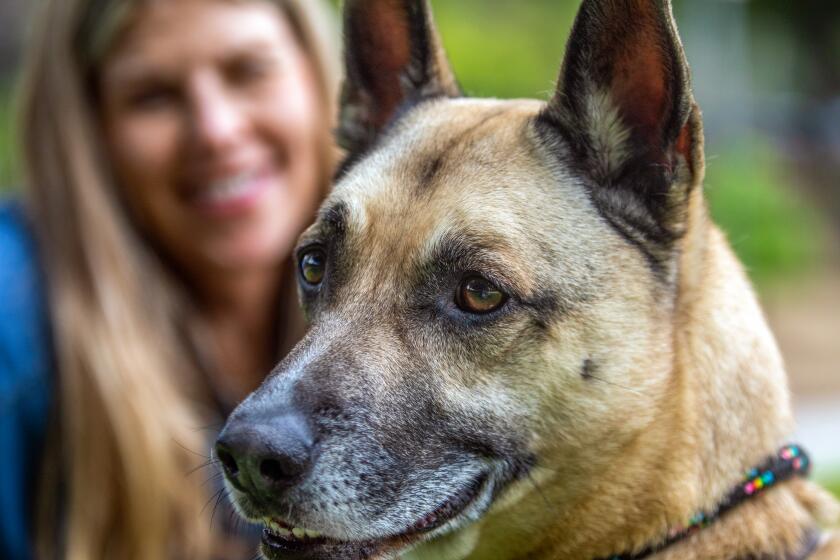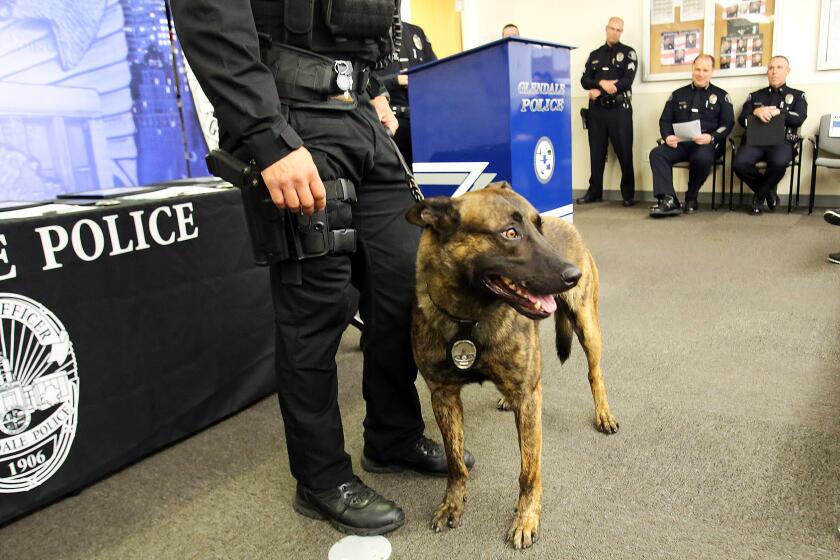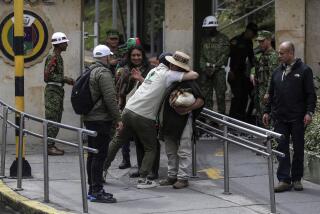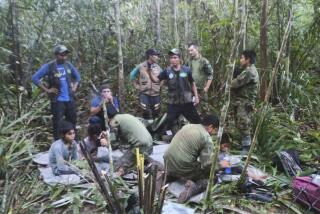Wilson the dog helped find 4 children in the Colombian Amazon. Now searchers are looking for him
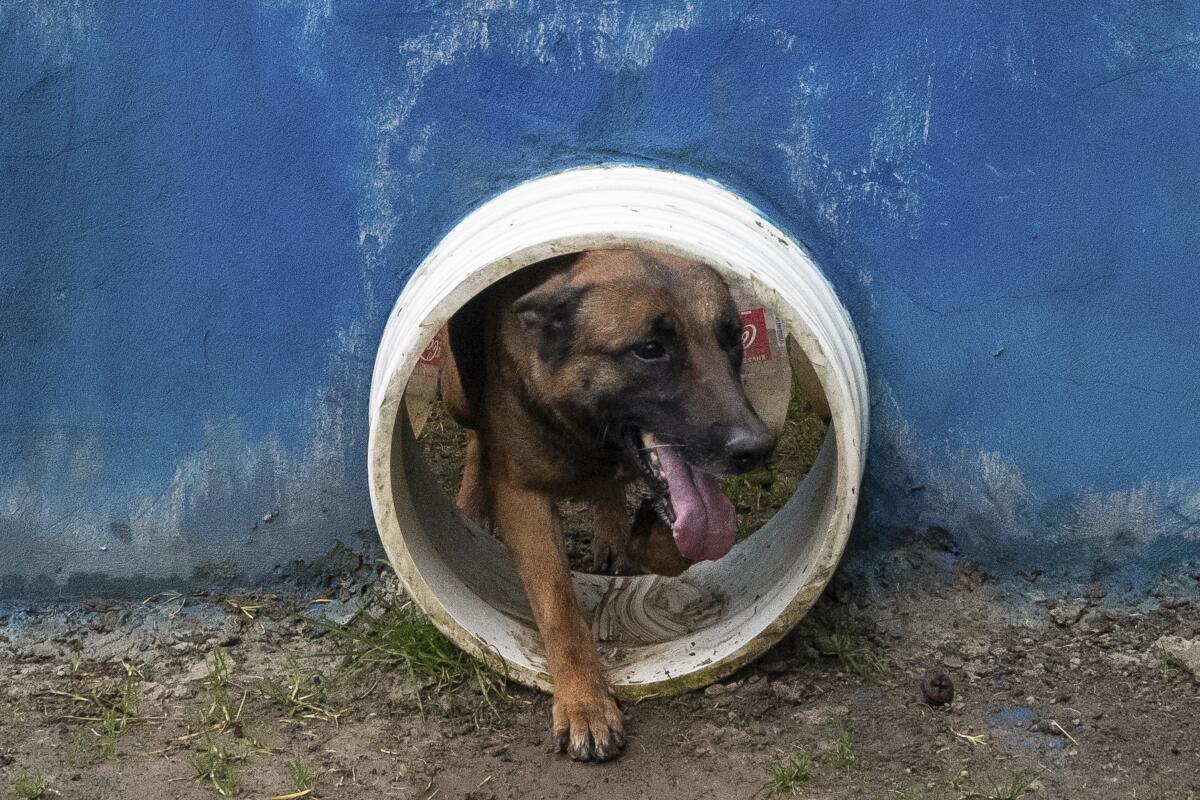
- Share via
BOGOTÁ, Colombia — With his powerful snout and pointy ears, Wilson became a national hero in Colombia when he helped the military find four Indigenous children who survived a plane crash and were lost in the Amazon jungle for 40 days.
Paw prints from the military-trained search dog led trackers to the children earlier this month. But the Belgian shepherd went missing during the search and is now himself the target of a sophisticated rescue operation that started soon after the four young survivors were flown on a helicopter to Bogotá.
The Colombian military says it has left 70 soldiers in the dense swath of jungle around the crash site to look for its beloved search dog. Commanders have vowed not to leave the remote area until soldiers return home with the star pup.
It’s been a month since Wilson got lost in the rainforest, and its hard to know if the 2-year-old canine is still alive. But the sniffer dog’s rescue would lift the spirits of many Colombians, and add a heartwarming exclamation point to a survival story that already has captivated the world.
“For us it was an honor that our canine helped to find those children,” said Sgt. Luis Fernando Seña, the commander of the canine school where Wilson was trained for 14 months in Bogota.
“It would be great news for the country, and for our children, if he can be found,” Seña said.
After her rescue dog, Buddy, bit someone, Michelle Madden tapped bad-dog experts for help. Their advice made the situation worse, so Madden had to find another solution.
Wilson graduated from the canine academy in February and was taken to the Tolemaida air force base, where he joined Colombia’s special forces. Wilson and four other sniffer dogs were taken to the rainforest in May to find the single-engine Cessna that had crashed in the rainforest. The four children survived, but three adults were found dead.
When the small plane was found and the search party realized that the children could still be alive, Wilson’s handler gave him some clothes to sniff to track down the kids.
The dog got separated from the search party May 18 after he sped off into the forest following a scent. Ten days later, the military found the children’s footprints next to his paw prints. Those clues helped searchers close in on the area where the children were found June 9, said Gen. Pedro Sanchez, who led the rescue effort.
“The children spoke to us and confirmed that the dog was with them for two or three days,” Sanchez told Colombia’s W radio.
Two California Democrats said their bill aims to “end a deeply racialized and harmful practice that has been a mainstay in America’s history of racial bias and violence against Black Americans and people of color.”
The children are still recovering in a hospital and have not spoken to the media. But recently, 13-year-old Lesly Mucutuy, the oldest of the four siblings who survived the crash and ordeal in the jungle, drew a picture of the rainforest that included a black-and-coffee-colored dog, which looks like Wilson.
Last week, Colombia’s military said that it helicoptered two female dogs in heat to the area around the crash site, in the hopes of luring Wilson toward the search party. Food has also been placed for the dog at several points around the crash site as well as clothes belonging to his handler, hoping that their scent can guide Wilson back to safety.
But some experts believe that Wilson may have already perished in the rainforest, where a dog might struggle to find food and also risks attacks from poisonous snakes.
Colombia continues to root for the stranded pup: Wilson’s name has become a popular hashtag on social media sites, with his fans posting messages that urge the military to continue the search. The dog’s story has led national news shows. And a spiritual coach who claims she can speak with animals recently posted a viral video on TikTok in which she urges her followers to thank Wilson for the job he did and “send light” to him so that he can find his way home — if that is what his soul desires.
Military’s dogs of war also suffer post-traumatic stress disorder
“He is very energetic, and always stood out because of his strength, his energy and his strong temperament,” said Elvis Porras, a trainer who helped raise Wilson and worked with him until his graduation from the military academy earlier this year.
“He is a distant relative of wolves, so I hope his instinct to hunt will help him to survive.”
More to Read
Sign up for Essential California
The most important California stories and recommendations in your inbox every morning.
You may occasionally receive promotional content from the Los Angeles Times.
